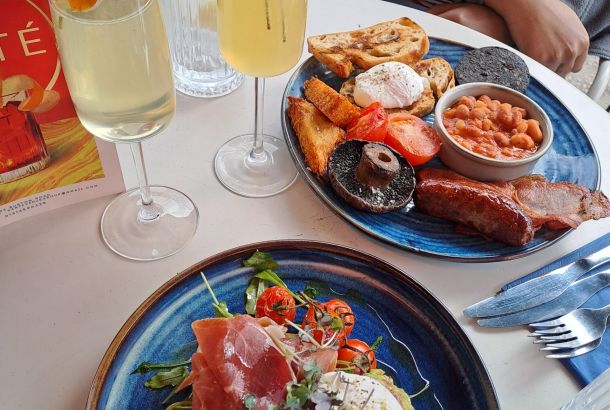Duck ragù: A recipe that will beat the winter blues

After contemplating various lies designed to endow my recipe with authenticity or sophistication, I have decided to admit that I first saw this dish in The Sopranos. Its northern Italian origin and use of gamier meat instantly set it apart from the standard beef ragù eaten by Napolitani, Calabrese, and their descendants in New Jersey. My interest was further piqued when I found that the dish contained spices I’d never seen in my nonna’s cooking; I had to have it.
One should note that considering the price of duck and the three to four hours of preparation time for this ragù, it isn’t the most convenient dish for student living. That said, it was perfect for a flat dinner and is certain to impress on any other special occasion.
Ingredients:
- Three duck breasts
- Three small carrots
- Two/three onions, depending on size
- Three cloves of garlic
- Two sticks of celery
- Half/one chilli (I used Scotch bonnet, but make sure not to add more than half a Scotch bonnet if you aren’t a fan of heat in pasta)
- Two decently sized plum tomatoes
- Two tins of peeled tomatoes
- Spices: cinnamon, bay leaves, smoked paprika and/or paprika, black pepper, cloves, and allspice
- Salt
- Sugar
- Toasted sesame oil (refined sesame oil also works)
- Butter
- Balsamic vinegar
- Lemon juice
- About 250ml red wine (I’d probably use more)
- A dash of tomato puree or passata/a few chopped sundried tomatoes
- Pasta (I used 500g spaghetti, but a true Venetian nonna would use paccheri)
Potential cost of living cuts
Some optional changes include using celery as the unseasoned cousin of onion in a ragù, or sesame oil can be replaced with olive or rapeseed oil if you want to save money. Cloves and allspice are also optional but make the flavour much richer, whilst tomato passata or its alternatives can be left out and fresh tomatoes may also be omitted. Finally, washing the meat is a habit with debatable importance, and you can use water instead of balsamic and lemon or just skip it.
Preparation
Rinse the duck breasts with balsamic vinegar and lemon juice before removing the fat and rubbing it with a generous amount of salt.
Then, marinate the breasts with balsamic, sesame oil, cinnamon cloves, black pepper, sugar, and allspice. Chilli will be added later, so the dish at this stage should look like austerity jerk.
I love to add Angostura bitters to my marinade, but this is optional. It may be worth the investment, however, as the rest of the bottle will add modest amounts of alcohol and flavour to any beverage for months to come.
Leave the duck in the marinade for one hour, two at a push. The meat will stew for hours and does not necessarily need too much tenderisation before cooking.
Grilling the duck is next, and I use the middle tray at around 175 Celsius on the fan grill setting. Give them about 12 minutes on each side. I like to then sear the cuts in toasted sesame oil and butter for ten minutes, flipping them halfway. This will soak through and add a slightly nutty flavour to the duck.
While it’s on the stove, dice celery, garlic, onions, tomatoes, carrots, and chillies before mixing them with a few teaspoons of salt and a pinch of sugar.
Remove the duck from the pan and add the vegetables, stirring through the juices of the meat thoroughly. Take a fork and knife, then relentlessly stab and twist the duck until shredded.
When the vegetables are done, add the tinned tomatoes and stir through with the meat. Bring to a simmer and add salt, a little more sugar, red wine, chicken stock, a parmesan rind, and some passata.
This stage is where the dish is traditionally given its characteristic flavour; Venetians historically shipped in spices from the Balkans and Middle East and so would add cinnamon, smoked paprika, and bay leaves to the pasta sauce. These flavours are not typically associated with Italian cooking but go very well in a ragù.
The longest part of the cooking process is almost guaranteed to sap the most stable student’s will to live. It involves stirring the sauce over low-medium heat for a few hours. Additional salt, seasoning or a few leaves of basil can be added at the cook’s discretion to pass the time. There is no set time for the stewing process, but you should look for the duck to have largely blended into a thick sauce. Chunks of meat will ideally be tender enough to easily break up with a wooden spoon. When this is possible, prepare the pasta.
Boil the pasta according to package instructions in pre-salted water until al dente. As the ragù stews for so long, it will reduce a lot. I always end up adding half a cup of the pasta water to add volume at some point. Mix the pasta with the ragù, then serve with grated parmesan. Buon appetito!







